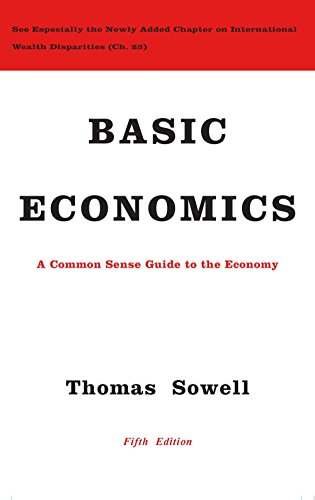“Basic Economics” by Thomas Sowell is a comprehensive introduction to the principles of free market economics. The book aims to provide a clear and accessible explanation of how markets work and how economic policies affect personal and societal outcomes. Here are ten key lessons from “Basic Economics”:
“The first lesson of economics is scarcity: there is never enough of anything to satisfy all those who want it. The first lesson of politics is to disregard the first lesson of economics.”
Lesson 1: The first lesson of economics is scarcity
At its core, economics is the study of how individuals and societies allocate scarce resources to meet infinite wants and needs. Scarcity creates trade-offs and requires individuals to make choices that prioritize their most urgent needs over less pressing wants. Understanding the concept of scarcity is crucial to making informed economic decisions.
Lesson 2: Markets are a form of communication
Sowell argues that markets are not just places where goods and services are bought and sold, but a form of communication between buyers and sellers. Prices are signals that convey important information about the relative scarcity of goods and the preferences of consumers. Prices also provide incentives for producers to allocate resources efficiently and to innovate new products and technologies.
Lesson 3: There is no such thing as a free lunch
Every economic decision has costs, whether they are visible or hidden, direct or indirect. Resources that are used to produce one good or service cannot be used to produce another, creating a trade-off. Thus, there is always an opportunity cost associated with any economic decision.
Lesson 4: Prices provide incentives
Prices play a critical role in providing incentives for producers and consumers. High prices encourage producers to supply more of a good or service to meet demand, while low prices signal excess supply and prompt producers to reduce output. Similarly, high prices deter consumers from purchasing a good or service, while low prices stimulate demand.
Lesson 5: Transaction costs matter
In addition to the cost of the goods or services exchanged, there are transaction costs associated with conducting economic transactions. These include costs of finding reliable trading partners, negotiating deals, and enforcing contracts. High transaction costs can inhibit economic exchange, while reduced transaction costs can facilitate trade.
Lesson 6: Government intervention can have unintended consequences
Government policies designed to alleviate economic problems can have unintended consequences that offset or even worsen the original problem. For example, rent control policies may lead to housing shortages or decreased quality of housing, while price controls can create black markets and reduce the incentives for producers.
Lesson 7: The importance of property rights
Clear and enforceable property rights are essential to promote economic exchange and development. Property rights enable individuals to invest in and build long-term value, and create incentives for people to maintain and improve their property. In the absence of secure property rights, economic exchange and investment become risky and uncertain.
Lesson 8: Comparative advantage leads to gains from trade
Countries and individuals can benefit from specializing in the production of goods and services in which they have a comparative advantage. This leads to increased efficiency and productivity, which in turn leads to increased output and economic growth. Gains from trade occur when countries or individuals trade goods or services in which they have a comparative advantage.
Lesson 9: The importance of savings and investment
Savings and investment are a critical engine of economic growth. Savings provide the resources that are necessary for investment, which in turn leads to increased productivity and output. Without savings and investment, economies are unable to grow and improve the standard of living.
Lesson 10: The dangers of protectionism
Protectionist policies, such as tariffs and trade barriers, can have harmful effects on both domestic and international economies. These policies limit access to goods and services, raise prices for consumers, and create inefficiencies in the production process. Additionally, protectionist policies can lead to retaliation from other countries, creating a lose-lose situation.
Conclusion
“Basic Economics” is an excellent resource for individuals seeking a foundational understanding of how markets work and how economic policies impact personal and societal outcomes. The book provides clear and accessible explanations of complex economic concepts and offers practical insights into how individuals can make informed economic decisions.




